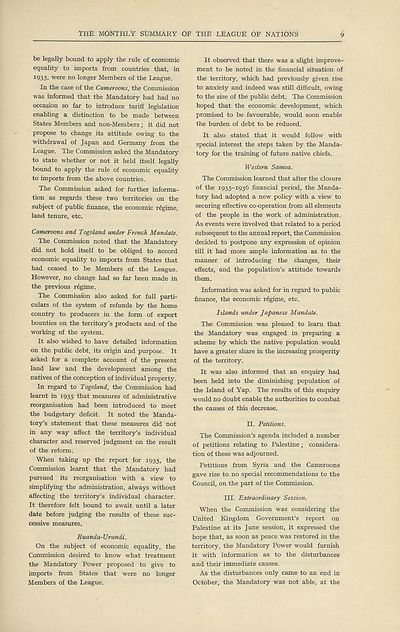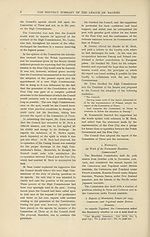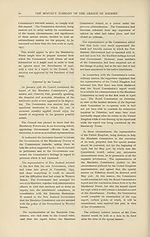Download files
Complete book:
Individual page:
Thumbnail gallery: Grid view | List view

THE MONTHLY SUMMARY OF THE LEAGUE OF NATIONS 9
be legally bound to apply the rule of economic
equality to imports from countries that, in
1935. were no longer Members of the League.
In the case of the Cameroons, the Commission
was informed that the Mandatory had had no
occasion so far to introduce tariff legislation
enabling a distinction to be made between
States Members and non-Members ; it did not
propose to change its attitude owing to the
withdrawal of Japan and Germany from the
League. The Commission asked the Mandatory
to state whether or not it held itself legally
bound to apply the rule of economic equality
to imports from the above countries.
The Commission asked for further informa¬
tion as regards these two territories on the
subject of public finance, the economic regime,
land tenure, etc.
Cameroons and Togoland under French Mandate.
The Commission noted that the Mandatory
did not hold itself to be obliged to accord
economic equality to imports from States that
had ceased to be Members of the League.
However, no change had so far been made in
the previous regime.
The Commission also asked for full parti¬
culars of the system of refunds by the home
country to producers in the form of export
bounties on the territory’s products and of the
working of the system.
It also wished to have detailed information
on the public debt, its origin and purpose. It
asked for a complete account of the present
land law and the development among the
natives of the conception of individual property.
In regard to Togoland, the Commission had
learnt in 1935 that measures of administrative
reorganisation had been introduced to meet
the budgetary deficit. It noted the Manda¬
tory’s statement that these measures did not
in any way affect the territory’s individual
character and reserved judgment on the result
of the reform.
When taking up the report for 1935, the
Commission learnt that the Mandatory had
pursued its reorganisation with a view to
simplifying the administration, always without
affecting the territory’s individual character.
It therefore felt bound to await until a later
date before judging the results of these suc¬
cessive measures.
Ruanda-Urundi.
On the subject of economic equality, the
Commission desired to know what treatment
the Mandatory Power proposed to give to
imports from States that were no longer
Members of the League.
It observed that there was a slight improve¬
ment to be noted in the financial situation of
the territory, which had previously given rise
to anxiety and indeed was still difficult, owing
to the size of the public debt. The Commission
hoped that the economic development, which
promised to be favourable, would soon enable
the burden of debt to be reduced.
It also stated that it would follow with
special interest the steps taken by the Manda¬
tory for the training of future native chiefs.
Western Samoa.
The Commission learned that after the closure
of the 1935-1936 financial period, the Manda¬
tory had adopted a new policy with a view to
securing effective co-operation from all elements
of the people in the work of administration.
As events were involved that related to a period
subsequent to the annual report, the Commission
decided to postpone any expression of opinion
till it had more ample information as to the
manner of introducing the changes, their
effects, and the population’s attitude towards
them.
Information was asked for in regard to public
finance, the economic regime, etc.
Islands under Japanese Mandate.
The Commission was pleased to learn that
the Mandatory was engaged in preparing a
scheme by which the native population would
have a greater share in the increasing prosperity
of the territory.
It was also informed that an enquiry had
been held into the diminishing population of
the Island of Yap. The results of this enquiry
would no doubt enable the authorities to combat
the causes of this decrease.
II. Petitions.
The Commission’s agenda included a number
of petitions relating to Palestine ; considera¬
tion of these was adjourned.
Petitions from Syria and the Cameroons
gave rise to no special recommendations to the
Council, on the part of the Commission.
III. Extraordinary Session.
When the Commission was considering the
United Kingdom Government’s report on
Palestine at its June session, it expressed the
hope that, as soon as peace was restored in the
territory, the Mandatory Power would furnish
it with information as to the disturbances
and their immediate causes.
As the disturbances only came to an end in
October, the Mandatory was not able, at the
be legally bound to apply the rule of economic
equality to imports from countries that, in
1935. were no longer Members of the League.
In the case of the Cameroons, the Commission
was informed that the Mandatory had had no
occasion so far to introduce tariff legislation
enabling a distinction to be made between
States Members and non-Members ; it did not
propose to change its attitude owing to the
withdrawal of Japan and Germany from the
League. The Commission asked the Mandatory
to state whether or not it held itself legally
bound to apply the rule of economic equality
to imports from the above countries.
The Commission asked for further informa¬
tion as regards these two territories on the
subject of public finance, the economic regime,
land tenure, etc.
Cameroons and Togoland under French Mandate.
The Commission noted that the Mandatory
did not hold itself to be obliged to accord
economic equality to imports from States that
had ceased to be Members of the League.
However, no change had so far been made in
the previous regime.
The Commission also asked for full parti¬
culars of the system of refunds by the home
country to producers in the form of export
bounties on the territory’s products and of the
working of the system.
It also wished to have detailed information
on the public debt, its origin and purpose. It
asked for a complete account of the present
land law and the development among the
natives of the conception of individual property.
In regard to Togoland, the Commission had
learnt in 1935 that measures of administrative
reorganisation had been introduced to meet
the budgetary deficit. It noted the Manda¬
tory’s statement that these measures did not
in any way affect the territory’s individual
character and reserved judgment on the result
of the reform.
When taking up the report for 1935, the
Commission learnt that the Mandatory had
pursued its reorganisation with a view to
simplifying the administration, always without
affecting the territory’s individual character.
It therefore felt bound to await until a later
date before judging the results of these suc¬
cessive measures.
Ruanda-Urundi.
On the subject of economic equality, the
Commission desired to know what treatment
the Mandatory Power proposed to give to
imports from States that were no longer
Members of the League.
It observed that there was a slight improve¬
ment to be noted in the financial situation of
the territory, which had previously given rise
to anxiety and indeed was still difficult, owing
to the size of the public debt. The Commission
hoped that the economic development, which
promised to be favourable, would soon enable
the burden of debt to be reduced.
It also stated that it would follow with
special interest the steps taken by the Manda¬
tory for the training of future native chiefs.
Western Samoa.
The Commission learned that after the closure
of the 1935-1936 financial period, the Manda¬
tory had adopted a new policy with a view to
securing effective co-operation from all elements
of the people in the work of administration.
As events were involved that related to a period
subsequent to the annual report, the Commission
decided to postpone any expression of opinion
till it had more ample information as to the
manner of introducing the changes, their
effects, and the population’s attitude towards
them.
Information was asked for in regard to public
finance, the economic regime, etc.
Islands under Japanese Mandate.
The Commission was pleased to learn that
the Mandatory was engaged in preparing a
scheme by which the native population would
have a greater share in the increasing prosperity
of the territory.
It was also informed that an enquiry had
been held into the diminishing population of
the Island of Yap. The results of this enquiry
would no doubt enable the authorities to combat
the causes of this decrease.
II. Petitions.
The Commission’s agenda included a number
of petitions relating to Palestine ; considera¬
tion of these was adjourned.
Petitions from Syria and the Cameroons
gave rise to no special recommendations to the
Council, on the part of the Commission.
III. Extraordinary Session.
When the Commission was considering the
United Kingdom Government’s report on
Palestine at its June session, it expressed the
hope that, as soon as peace was restored in the
territory, the Mandatory Power would furnish
it with information as to the disturbances
and their immediate causes.
As the disturbances only came to an end in
October, the Mandatory was not able, at the
Set display mode to:
![]() Universal Viewer |
Universal Viewer | ![]() Mirador |
Large image | Transcription
Mirador |
Large image | Transcription
Images and transcriptions on this page, including medium image downloads, may be used under the Creative Commons Attribution 4.0 International Licence unless otherwise stated. ![]()
| League of Nations > Background to the League > Monthly summary of the League of Nations > Vol. 17 1937 > (35) |
|---|
| Permanent URL | https://digital.nls.uk/194721922 |
|---|
| Attribution and copyright: |
|
|---|---|
| Shelfmark | LN.8 |
|---|---|
| Description | Over 1,200 documents from the non-political organs of the League of Nations that dealt with health, disarmament, economic and financial matters for the duration of the League (1919-1945). Also online are statistical bulletins, essential facts, and an overview of the League by the first Secretary General, Sir Eric Drummond. These items are part of the Official Publications collection at the National Library of Scotland. |
|---|---|
| Additional NLS resources: |
|

